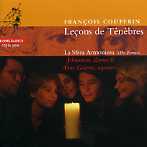Soprano Anne Grimm is a wonderful singer, with a lovely, warm voice, accurate intonation, and an expressive technique that perfectly captures the mood and meaning of these laments, extended songs that require exceptional sensitivity and subtlety. Her sense of phrasing, her delicate use of ornaments, and her thoughtful gradations of dynamics and articulation, so important in this music, keep us attentive to Couperin’s beautiful melodies and artfully integrated texts. And Johannette Zomer, who has displayed a tendency toward hard and even shrill tone in some past outings, shows little of that here. In fact, she uses her bright timbre quite effectively, even though her solo movement–the Deuxième Leçon de Ténèbres–is not quite as musically compelling as the Première Leçon sung by Grimm. Their Troisième Leçon duet shows two singers with agreeably different timbres but one interpretive voice–and the effect of their performance is one of those uniquely communicative moments where the spiritual and artistic worlds make a happy meeting.
Although nothing is mentioned in the notes, the singers employ a French pronunciation of the Latin, a striking and unusual sound for listeners used to hearing the more common Roman Church or German or even Anglican Latin in vocal performances.
The instrumentalists also must receive kudos for their various expert contributions, from accompaniments of the voices (Mike Fentross’ theorbo is particularly eloquent) to their separate offerings of Marin Marais’ Les voix Humaines (gambist Paulina van Laarhoven deserves a whole disc to herself!) and Robert de Visée’s lute transcription of Couperin’s keyboard work Les Sylvains.
The programming, which places the instrumental pieces (both of which are contemporary to Couperin) in between the three Leçons, also shows something of the thought and care that went into its design. And of course, Channel Classics maintains its customary high sonic standard (I listened on a regular CD system, not SACD-surround) making this a highly recommendable presentation of some rare and challenging repertoire. [6/9/2006]
































